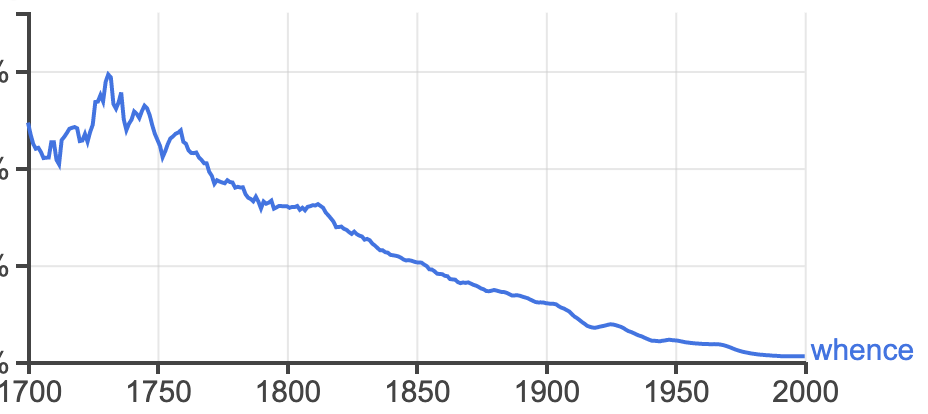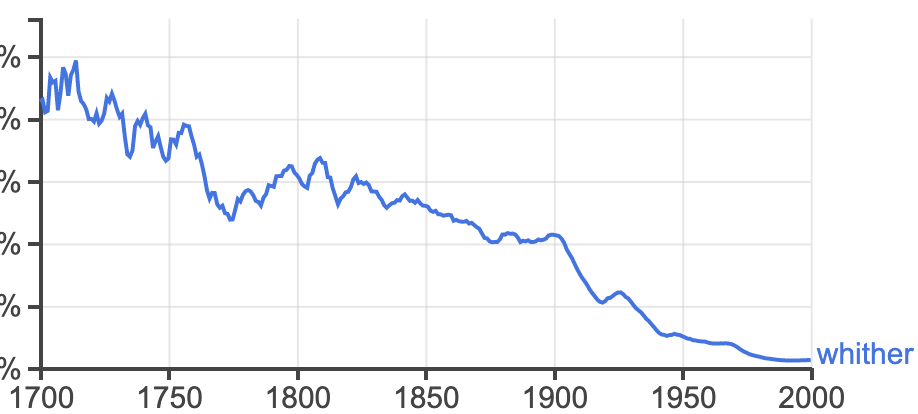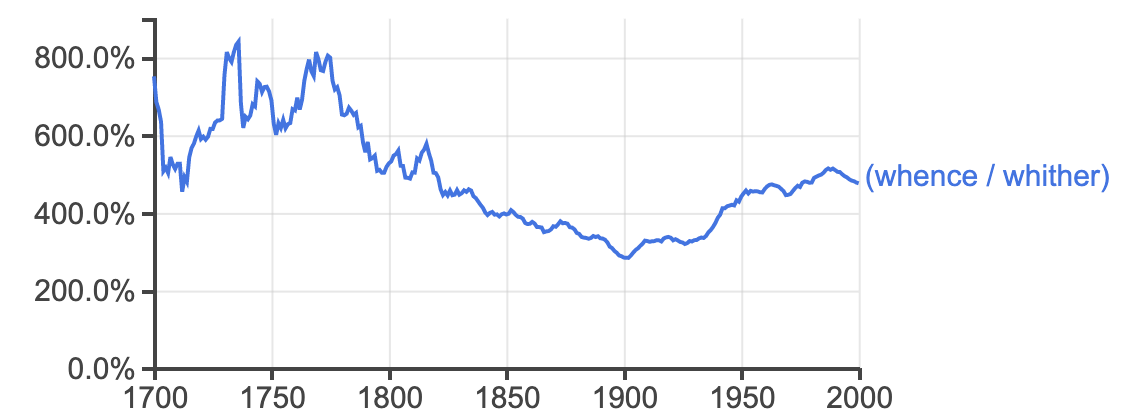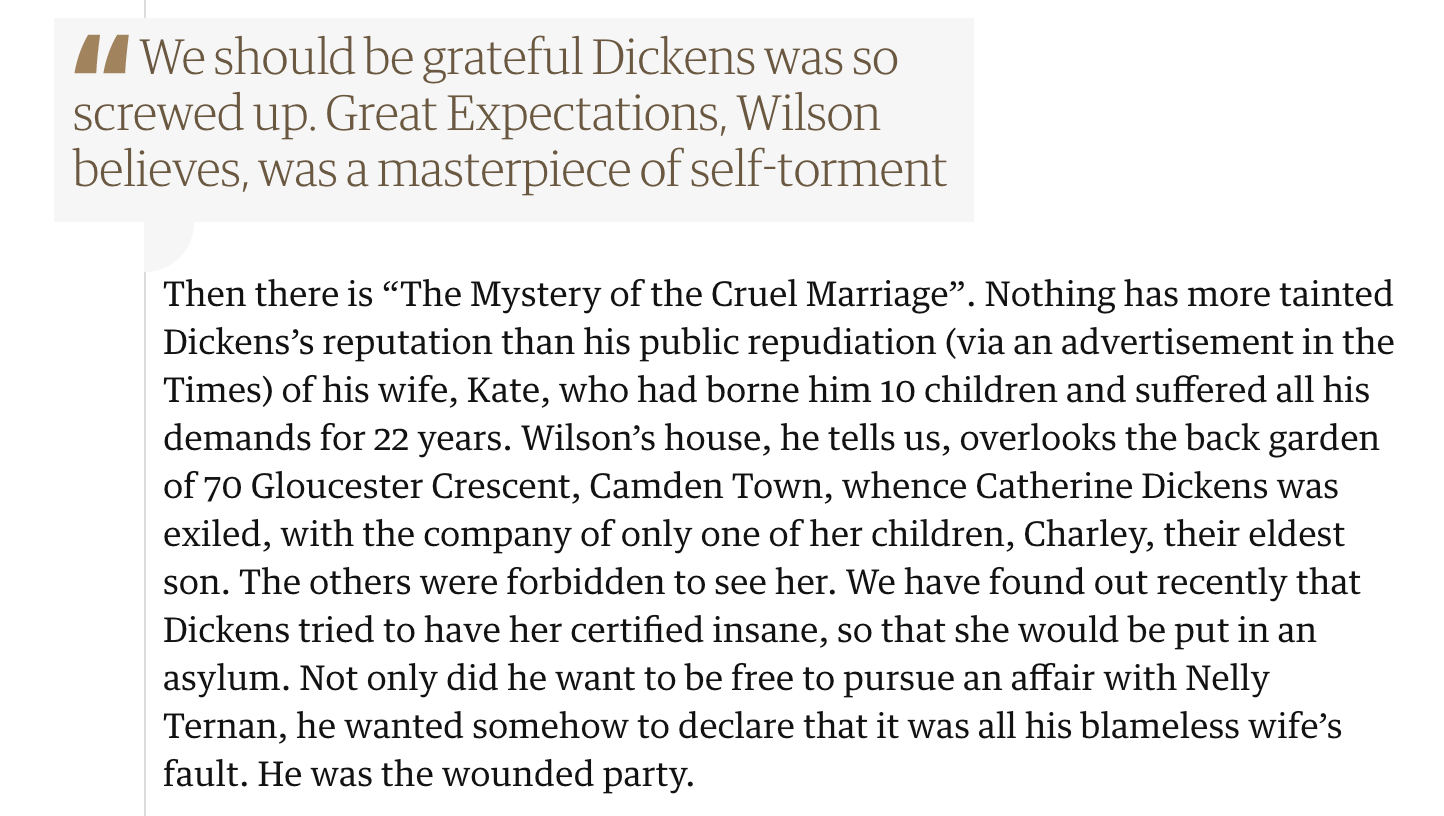Whither, whence, whatever
« previous post | next post »
John Mullan, "The Mystery of Charles Dickens by AN Wilson review — a great writer's dark side", The Guardian 6/3/2020 [emphasis added]:
Then there is “The Mystery of the Cruel Marriage”. Nothing has more tainted Dickens’s reputation than his public repudiation (via an advertisement in the Times) of his wife, Kate, who had borne him 10 children and suffered all his demands for 22 years. Wilson’s house, he tells us, overlooks the back garden of 70 Gloucester Crescent, Camden Town, whence Catherine Dickens was exiled, with the company of only one of her children, Charley, their eldest son. The others were forbidden to see her. We have found out recently that Dickens tried to have her certified insane, so that she would be put in an asylum. Not only did he want to be free to pursue an affair with Nelly Ternan, he wanted somehow to declare that it was all his blameless wife’s fault. He was the wounded party.
In older English, whence was used to mean "from what place", and whither was used to mean "to what place". The context of the phrase in Mullan's review suggests that he meant whither Catherine Dickens was exiled rather than whence Catherine Dickens was exiled — i.e. "where Catherine Dickens was exiled to" rather than "where Catherine Dickens was exiled from". The Wikipedia article for Catherine Dickens confirms this:
In June 1858, Charles and Catherine Dickens separated, and she moved into a property on Gloucester Crescent in Camden Town.
Both whence and whither have been going out of style for two or three hundred years:
But throughout this time, whence has been about five times more common:
Bob Ladd, who sent in the link, suggested a reason for the mistake:
The only conclusion I can draw is that in writing Exhibit A, the reviewer (John Mullan) was aiming for "whither" and hit "whence" instead. To me, at least, "whither" sounds somehow more archaic than "whence" – I'm not sure why – so Mullan may have accessed "whither", thought "No, that sounds weird, it can't be right" and chose "whence" instead. Bad move.
I'd go for a less conscious malapropism, probably of the Faye-Cutler rather than the Sheridan variety. In any case, it's interesting that neither Mullan nor the Guardian's editor caught it (although the Guardian has long outgrown the patterns that gave it the nickname Grauniad…)




john burke said,
June 7, 2020 @ 6:00 pm
"Whence" also occurs in a standard element of logical argument: "whence it follows that…" etc. Is there a comparable use of "whither"? If not, this special usage might account for some of the difference in frequency of use.
Andrew Usher said,
June 7, 2020 @ 6:43 pm
Or, perhaps, the original wording was 'to whence', which was then mis-corrected?
As far as I know, 'whence' is not a standard term in logic, 'hence' is. They should not be confused either.
k_over_hbarc at yahoo.com
Anthony said,
June 7, 2020 @ 6:53 pm
The third member of this trio is "thence": 'from there' as opposed to 'from here' (hence) and 'from where' (whence).
George said,
June 7, 2020 @ 8:44 pm
Is "whitherto" still more precise, by analogy to hitherto and thitherto? By itself, "whither" strikes me as interrogatory in nature. When used to make a declarative statement of fact, "to" is no longer implied (or may be supplied even if redundant). Thus "whitherto Catherine Dickens was exiled."
Bob Ladd said,
June 8, 2020 @ 12:13 am
@John Burke: The only halfway normal use of whither I can think of is in rhetorical questions like "Whither America?" If you type whither into Google followed by one or two letters, it will suggest things like "Whither America", "Whither democracy", "Whither the nation state", and so on.
@MYL: Thanks for the frequency data – that presumably explains at least my feeling that whither sounds more archaic than whence.
[(myl) There's John Pierce's 1969 JASA piece, "Whither Speech Recognition?" ]
cameron said,
June 8, 2020 @ 12:57 am
whence is a command in some command line shells supported on various Unix and Unix-alike systems, notably the k-shell. It was always mildly amusing that you could enter a command like
whence whichand have it actually make sense.I think I might have once amused myself by writing a script to implement a whither command in my environment, but I don't remember what it did. It was probably something that was pretty useful for about a week and I never needed again.
Jen in Edinburgh said,
June 8, 2020 @ 4:49 am
It feels a bit like possible contamination from 'where' (which would have been fine!).
The original sentence would have been fine if 70 Gloucester Crescent was the place where Dickens and the other children had stayed, and she had been sent elsewhere, but I don't think that's the case…
Andreas Johansson said,
June 8, 2020 @ 5:05 am
As a L2 speaker, I may occasionally use whence/hence/thence, but probably never whither/hither/thither outside of quotation.
Keith said,
June 8, 2020 @ 5:22 am
@Anthony
The third member of this trio is "thence": 'from there' as opposed to 'from here' (hence) and 'from where' (whence).
It is in fact a quartet: whence and whither, hither and thither.
In British English, the words "hither and thither" are sometimes used to indicate wandering or imprecise movement, even in quite ordinary speech and text. It sounds a bit archaic, but not particularly so, and not affected or pompous.
SS said,
June 8, 2020 @ 5:24 am
I recall the word whence being used most often (and online usage advice pages seem to confirm this) in the redundant phrase "go back from whence you came" or similar constructions. Whence gives off a stuffy, literary quality – if this article had been about current events rather than the 19th century, I doubt the author would have selected whence over where. It reminds me of how whenever a legal topic is discussed, the speaker or writer will find a way to slip per se or stipulate into the conversation when other words would do.
Coby Lubliner said,
June 8, 2020 @ 8:01 am
Isn't the "whither thou goest" quote from the King James version of Ruth still occasionally used in wedding ceremonies?
Rodger C said,
June 8, 2020 @ 8:54 am
What, without asking, hither hurried whence?
And, without asking, whither hurried hence!
Another and another Cup to drown
The Memory of this Impertinence!
Orin Hargraves said,
June 8, 2020 @ 9:09 am
I wrote about these in 2008: https://www.visualthesaurus.com/cm/ll/whither-ancient-adverbs/
It's a pity if they've fallen so far out of currency that even editors don't notice! Whither tradition?
Robert Coren said,
June 8, 2020 @ 9:17 am
Or Wilson could have avoided the whole problem by saying "to which", which would have been perfectly grammatical and idiomatic and unambiguous.
@Keith: In addition to "hither and thither", I've encountered "hither and yon", which is a bit easier to get the tongue around.
Tom Dawkes said,
June 8, 2020 @ 9:56 am
Considering John Mullan is a professor of English literature, it is an amazing error — and rather pretentious.
[(myl) If it was a Faye-Cutler malapropism, it could happen to anyone…]
Kenny Easwaran said,
June 8, 2020 @ 1:23 pm
"Hither" of course is also part of the phrase "come hither", which is sometimes a description used for sexy clothing or looks. But "whither" I've mainly only seen in titles like "whither democracy?", and "thither" is extremely rare. "Hence" is mainly used in the non-spatial sense of "thus", while "whence" is a bit rarer, and "thence" seems very rare.
These triples are also parallel to triples with prepositions others have mentioned: hereto/thereto/whereto (all used, but not that common), herefor/therefor/wherefor (one used with an alternate spelling, one used by Juliet, and one extremely rare), herein/therein/wherein (all quite common), etc.
Terry Hunt said,
June 8, 2020 @ 1:34 pm
In my distant youth, "whither" was I think a little better known in BrE because the title of the 1896 novel (written by Henryk Sienkiewicz) and 1951 film (directed by Mervyn LeRoy) Quo Vadis? was commonly translated as "Whither Goest Thou" (probably because it had a biblical origin).
I myself, being determinedly old-fashioned, will readily use thither, whither, thence and whence (not to mention hence), but subjectively I'd say that of these, opportunities for whence just crop up more often, so it may be the most familiar to many people and thus be inclined to mentally displace the others.
Thomas Rees said,
June 8, 2020 @ 3:44 pm
David Fay (no final e)
Andrew Usher said,
June 8, 2020 @ 5:54 pm
It seems to me that 'hither and thither' is the only remotely possible way to use 'thither' without being extremely archaic. By the way, 'thither' is the only word with successive /ð/ sounds, is it not?
'Therefor' is not the same as 'therefore', at least not in use – the meanings have been differentiated probably longer than the spellings have – and neither is 'wherefor' 'wherefore'.
Finally I can't agree with SS that 'per se' and 'stipulate' are particularly pompous or legalistic, even though the latter may have legal origin.
k_over_hbarc at yahoo.com
Graeme said,
June 9, 2020 @ 6:36 am
Compare hence. In 1800, ngram has it as only 75% as common as whence.
Whence has since withered.
Hence is in genteel decline, but still common.
J.W. Brewer said,
June 9, 2020 @ 8:05 am
Legal-jargon English (and maybe some other varieties) still use lots of compounds floating around this lexical area ("hereinafter" or "heretofore") that may sound fussy or archaic in other registers of English. I think I have my own self in non-professional writing used "thitherto" (where "hitherto" wasn't quite right), but perhaps it was in a context where that sort of formal-register lexeme seemed slightly jocular and thus appropriate for a more colloquial register.
I have stuck in my memory the Yeats poem with the lines "Whence came our thought? / From four great minds that hated Whiggery." Maybe it's poetic diction, but it illustrates the simple usefulness and efficiency of the word, since "Where did our thought come from" requires a lot more syllables to ask the same question.
Rodger C said,
June 9, 2020 @ 8:28 am
By the way, 'thither' is the only word with successive /ð/ sounds, is it not?
I've often heard "thither" pronounced with /θ/ as third phoneme by people who obviously don't use it much.
Bob Ladd said,
June 9, 2020 @ 9:22 am
@ Rodger C
And I've heard it with /θ/ at the beginning (i.e. /θɪðə(ɹ)/).
Robert Coren said,
June 9, 2020 @ 9:37 am
@Bob Ladd: "And I've heard it with /θ/ at the beginning (i.e. /θɪðə(ɹ)/)." Yeah, me too. I was going to say that I thought that's how I say it, but brief experiment says I use /ð/ for both "th"s, which makes sense since I would never use /θ/ in there.
Ellen K. said,
June 9, 2020 @ 2:35 pm
I thought it was /θɪðə(ɹ)/. The two dictionaries I've checked, Merriam-Webster and Wiktionary, both listed both /ðɪðə(ɹ)/ and /θɪðə(ɹ)/, though they differ on which they list first. Neither have /θɪθə(ɹ)/, and seems to me θ in the middle of a word would be odd.
Philip Taylor said,
June 9, 2020 @ 3:27 pm
Andrew — "By the way, 'thither' is the only word with successive /ð/ sounds, is it not?". If by "successive" you mean "with no intervening consonants, then I think that the answer is probably 'yes', but there is at least one word with two /ð/ sounds — 'therewith'.
Philip Taylor said,
June 9, 2020 @ 3:53 pm
Ellen — some counter-examples to "θ in the middle of a word would be odd" : Abernethy, æsthete, aforethought, … Zarathustra.
J.W. Brewer said,
June 9, 2020 @ 4:41 pm
For two consecutive (separated only by a vowel) instances of /θ/ there's Thoth, which is a loanword but one whose pronunciation one might reasonably have expected to be distorted from an echt-Ancient-Egyptian pronunciation to extent necessary to be managed by Anglophones.
Daniel said,
June 9, 2020 @ 8:36 pm
The Christmas carol "Good King Wenceslas" contains the word "thither" in the third verse. (It also contains "hither" in the second.) I, and most of my fellow carolers, pronounced it /ðɪðə(ɹ)/, but a guest caroler from a very prestigious chorus clearly and loudly pronounced it /θɪðə(ɹ)/, so I suppose that might be the "correct" choice.
Philip Taylor said,
June 10, 2020 @ 1:59 am
"Thoth" is a good catch, although in my mind it has always been /təʊθ/. The LPD has θəʊθ təʊt, θɒθ ǁ θoʊθ toʊt. But the original claim was about two consective /ð/s rather than /θ/s.
Ellen K. said,
June 10, 2020 @ 2:28 pm
@Philip Taylor. Interesting to learn that some people pronounce "with" with a ð rather than a θ. I'm sure I've heard both variants plenty, but I've never noticed the variation. (The longer "therewith" I can't be sure to have ever heard at all.)
Andrew Usher said,
June 10, 2020 @ 7:00 pm
'With' is pronounced with /θ/ by most Americans and /ð/ by most Englishmen. Compounds now generally follow whichever choice is made, nowadays; however –
From Nolst Trenite's poem: "With and forthwith, one has voice,
One has not …". That is, the standard RP he learned (which no one reading the poem tries to imitate the pronunciations of, unfortunately for a poem about those very pronunciations) had /wɪð/ and /fɔːθˈwɪθ/; 'therewith' would follow 'forthwith' due to its second-syllable stress which historically protected the fricative from voicing. And 'withal' is supposed to always be voiced (Vernerism) but in its surviving use 'wherewithal', many don't.
Philip Taylor: Ellen's "/θ/ in the middle of a word" really means /θ/ between vowels, which should not occur in native words.
ktschwarz said,
June 10, 2020 @ 8:14 pm
English speakers often don't notice the voiced/unvoiced variation in "with". See previous discussion at Language Log: How to pronounce with and the followup With in context, where Mark Liberman does some phonetic analysis on a speech corpus. As noted in comments on those posts, the /θ/-/ð/ contrast has very little functional load in English.
Philip Taylor said,
June 11, 2020 @ 3:09 am
Andrew / Ellen — "Ellen's "/θ/ in the middle of a word" really means /θ/ between vowels, which should not occur in native words" : Catherine, Athelstone, Ethel, ether, litho, bothy, Luther. Arguably some or all originally non-native, but all well assimilated by now.
Rachael Churchill said,
June 11, 2020 @ 7:01 am
Also: epithet, pithy/pithily (or pithing), methane (and all other organic chemicals beginning with meth- or eth-), toothy/toothily, breathy/breathily, earthy/earthily and earthing (between two vowels in my non-rhotic accent), and so on.
RP said,
June 11, 2020 @ 8:09 am
It wouldn't have occurred to me to pronounce "thither" other than with /ð/, given its relationship to "there" and "thence".
By the way, what's the technical reason why /ð/ at the start of a word sounds so different from /ð/ at the end of a word (or indeed in medial position), and why /θ/ at the start of a word sounds so different from /θ/ in other positions?
For example, even though I say /ðɪðə/, the two /ð/ sound different somehow. The second one is softer. As I child, I used to have trouble pronouncing both voiced and unvoiced "th" sounds, but there were three different sounds I substituted (/d/, /v/, /f/), not two. For instance, /ðɪðə/ would have been /dɪvə/ (and never /dɪdə/ nor /vɪvə/), while "thin" /θɪn/ was /fɪn/.
RP said,
June 11, 2020 @ 8:10 am
(On second thoughts I don't /θ/ sounds different in different positions. But /ð/ does.)
Robert Coren said,
June 11, 2020 @ 9:51 am
@Andrew Usher:
I (Northeastern US) definitely have /ð/ in both "with" and "therewith". I think I'd say "forthwith" with /θ/. This means I'm inconsistent about the "rule" on second-syllable stress, but my guess is that in my case the difference has more to do with the fact that the "-with" of "therewith" is very clearly the preposirtion "with", whereas the relationship in "forthwith" is less clear.
Andrew Usher said,
June 11, 2020 @ 6:00 pm
RP:
Your observations about the 'th' sounds are exactly the pattern documented for th-fronting accents. Initial /ð/ gets treated differently, though I can't tell why.
Robert Coren:
Evidence acknowledged (is voiced 'with' more common in that part of the US?), but one must admit that both 'therewith' and 'forthwith' are learned words today not necessarily reflecting any historical continuity.
Josh R said,
June 11, 2020 @ 7:28 pm
Philip Taylor said,
Andrew / Ellen — "Ellen's "/θ/ in the middle of a word" really means /θ/ between vowels, which should not occur in native words" : Catherine, Athelstone, Ethel, ether, litho, bothy, Luther. Arguably some or all originally non-native, but all well assimilated by now.
Catherine, ether, litho, bothy and Luther are all imports, and even assimilated imports are treated pretty inconsistently. What I find interesting is Athelstone and Ethel, both of which come from (or not even come from, they actually are) Old English æðel – meaning "noble". And which in Old English was likely pronounced with /ð/. (Note that while I used ð above, in contemporary writing both ð and þ were used interchangeably for both /ð/ and /θ/.)
So, I wonder: how do those in the U.K. pronounce "Edgar (the) Atheling?" Being from the U.S., I only encountered the name after I began studying Old English, and just assumed that it was pronounced with /ð/, as in Old English. It sounds like that might not be the case.
RP said,
June 12, 2020 @ 4:02 am
@Andrew Usher,
I realise th-fronting is normal in some accents, but it wasn't a feature particularly associated with my part of England, and neither of my parents did it, so they insisted on me learning to pronounce the sounds "properly", if you'll excuse their terminology.
It is curious that many websites describe th-fronting exclusively in terms of /f/ and /v/, without mentioning that initial /ð/ is treated differently.
But even when (as nowadays) I use /ð/, I find that the initial sound sounds different. I think that with initial /ð/ my tongue is slightly further forward and also moves backwards more subsequently, but I'm not sure if that's all there is to it.
Philip Taylor said,
June 12, 2020 @ 5:37 am
To be honest, I do not know how we in the UK generally pronounce "Atheling" as in "Edgar [the] Atheling" (he, and his name, are not things I have previously encountered), but I feel safe in assuming that John Wells does, and John reports //ˈæθ əl ɪŋ/ in the LPD. So /θ/, not /ð/.
Robert Coren said,
June 12, 2020 @ 8:52 am
is voiced 'with' more common in that part of the US?
I have no idea.
Robert said,
June 12, 2020 @ 6:10 pm
I always think of Vaughan William's song Whither Shall I Wander based on the poem of Robert Louis Stevenson
Philip Taylor said,
June 12, 2020 @ 6:30 pm
Not sure to which RLS poem you refer, Robert, but for me "whither shall I wander" is a part of the childhood nursery rhyme Goosey goosey gander :
chris said,
June 12, 2020 @ 6:45 pm
@Philip Taylor: ether-either is even a minimal pair, the only one I can come up with off the top of my head (although this is not a categorical statement that there are no others).
…Well, depending on how you pronounce "either", anyway.
Andrew Usher said,
June 12, 2020 @ 7:15 pm
Josh et al.:
I think we have to presume spelling pronunciation for the 'athel' words. An obvious example – which I'm surprise no one has mentioned – is 'brothel' with its now-usual /θ/. For the others, 'Catherine' and 'Luther' originally had /t/, and indeed like 'Anthony', have no etymological justification for their 'h'; while 'bothy', apparently, had /h/ (which standard English doesn't allow in that position) – and those are also spelling pronunciations.
I've wondered how old that for 'Catherine' is. As it's a big step from /'keː trɪn/ to /kæθ ə rɪn/ people must have been aware of its changing, yet the former pronunciation leaves no trace except in its shortenings 'Kate' and 'Katie'.
RP:
Th-fronting isn't known in my area either – it's not an American thing – but I stated the facts I've read. It can also be seen in dialect spellings, which never show 'v' for initial /ð/, but sometimes do 'd'.
Philip Taylor said,
June 13, 2020 @ 6:57 am
Chris, for me "ether-either" sound like /ˈiː θə- ˈaɪ ðə/, so not a true minimal pair, but "sooth-soothe" works for me ("sooth" being what a soothsayer says …).
Philip Taylor said,
June 13, 2020 @ 8:25 am
Also "teeth-teethe" (the latter being what an infant does).
Rodger C said,
June 13, 2020 @ 9:23 am
And "mouth-mouthe" (though the verb "to articulate a word without voice" is usually spelled "mouth").
Robert Coren said,
June 13, 2020 @ 11:25 am
@Philip Taylor: The poem and song to which the other @Robert refers is Whither Must I Wander (not "shall" — perhaps he was also thinking of the Goosey Gander rhyme); the song is the seventh one in Vaughn Williams' cycle Songs of Travel. I know this because I sang the whole set a few years ago.
Michèle Sharik Pituley said,
June 16, 2020 @ 11:27 am
When I try to say /θɪðə(ɹ)/ it sounds to me like I'm saying scissor with a lisp.
Philip Taylor said,
June 17, 2020 @ 11:17 am
I'd go along with that. Although as I never use "scissor" in the singular, I would have to say /θɪðə(ɹ)z/ to truly get that effect.